What Is GERD ?
The oesophagus is a muscular tube that carries food into the stomach. The secretions of the oesophgus are alkaline and the secretions of the stomach are acidic.
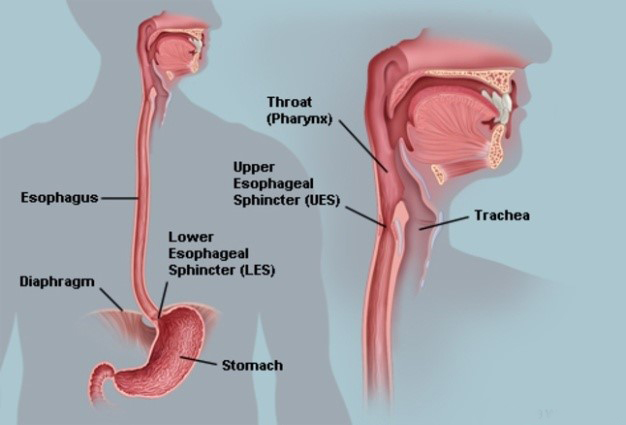
There is a sphincter at the lower end of the oesophagus ( LES) that maintains unidirectional flow of contents from the oesophagus to the stomach and not vice versa. This sphincter is basically a ring of muscles at the lower end of the oesophagus merging with the muscular fibres at the upper end of the stomach. This means that when the LES relaxes (opens), it allows food to flow from oesophagus to stomach, following which it closes. This LES when closed does not allow the return or reflux of food or acid from the stomach to enter into the oesophagus. The LES is not under voluntary control.
 model 1.jpg)
 model 2.jpg)
Gastroesophageal reflux disease (GERD) is a disease wherein the stomach acid frequently flows back into the oesophagus. This return or reflux of acidic contents into the alkaline environment of the oesophagus tends to irritate the mucosal lining of the oesophagus causing discomfort, the severity of which could vary. This plethora of discomfort is called as GERD.
Risk factors for GERD are:
Gastroesophageal reflux happens when the LES is weak or relaxes when it shouldn’t.
Factors that can aggravate acid reflux include:
Most people can manage the discomfort of GERD with lifestyle changes and some medications. When medication and lifestyle changes fail, surgery is the treatment of choice.
GERD affects people of all ages—from
infants to older adults to the old.
People with asthma are at higher risk of developing GERD. Asthma flare-ups can cause the lower esophageal sphincter to relax, allowing stomach contents to flow back, or
reflux, into the esophagus. Some asthma medications (especially theophylline) may worsen reflux symptoms.
On the other hand, Also, this irritation can trigger allergic reactions and make the airways more
sensitive to environmental conditions such as smoke or cold air.
Complications
As we have learnt that the acid from the stomach entering the alkaline environment of the oesophagus leads to inflammation in the esophageal mucosa. When this continues for a long time, months or years, the inflammation becomes chronic and can lead to certain complications:
Step by step changes in the mucosa from normal to Barrets over time due to GERD.
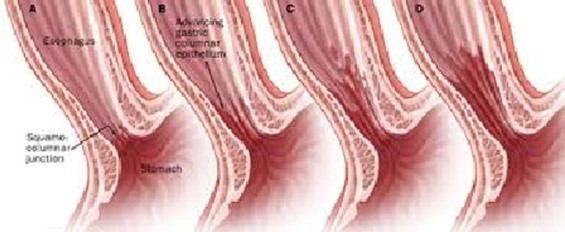
Diagnosis of GERD:
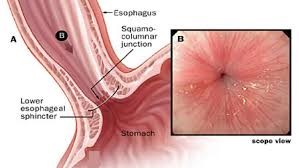

Treatment
Nissen’s Fundoplication

Toupet Fundoplication
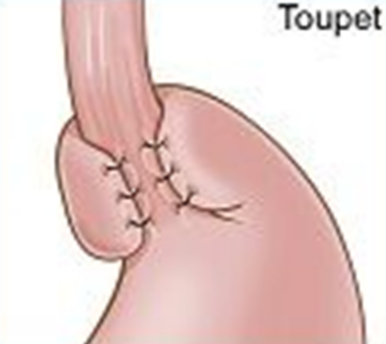
Dorr Fundoplication
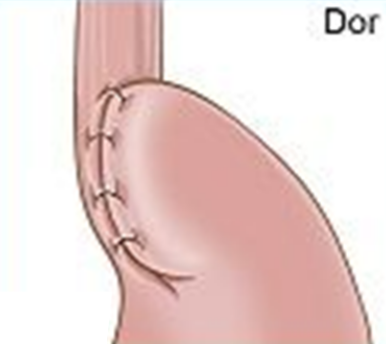
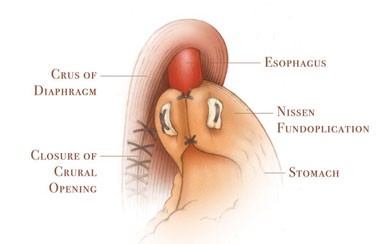
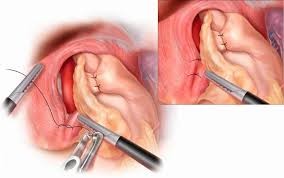
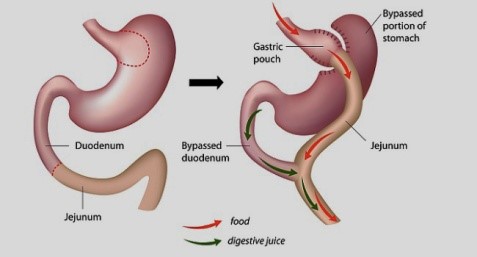
GERD or Gastroesophageal reflux disease is an ailment wherein the acidic fluid in the stomach flows back into the esophagus. When it refluxes, acidic content reacts with the alkaline environment of the esophagus and irritates the mucosal lining. It causes discomfort, which is known as GERD.
Common symptoms are heartburn and acid regulation. Initially, these symptoms are there only occasionally during the day related to the meals, but as time goes by and severity increases, the person may have these nagging and troubling symptoms all through the day. It begins after eating, which worsens at night. This really plays a major role in disrupting one’s daily routine putting all jobs on a hold and seeking a permanent solution. Other symptoms are chest pain, pain while swallowing, nausea, excess of saliva, inflammation of gums, chronic sore throat, bad breath, etc. Disturbed sleep is also complained about by some people.
Lax LES ( lower esophageal sphincter), Hiatus Hernia, increased intraabdominal pressure due to various reasons are the common causes of GERD. Obesity itself increases the intraabdominal pressure and makes people more prone to GERD. Loss of weight helps in a major way in relieving symptoms.
The first line of treatment is medication and strict lifestyle and dietary modifications. If there is no relief with medication, then surgical management is necessary.
Dietary modification in trms
of quantity, quality ( type of food) and timely intake of food are the foremost in the management of GERD along with medications like antacids PPI’s ( Proton pump inhibitors) etc.
When GERD is really severe and not relenting to medication and dietary andlifestyle modification, Laparoscopic fundoplication plays a major role and give excellent results. Fundoplication could be Nissens,
Toupet fundoplication, depending on your symptoms, diagnostic test results and intraoperative findings.
Dr Tulip’s Obesity and Diabetes Surgery Hospital Bangalore is the best place where you get systematic diagnosis and treatment for GERD.
Doctors analyze the risk factors and offer remedies according to individual requirement. The problem of GERD should not be overlooked as refluxing acids can cause metaplastic changes in the esophageal mucosal cell lining in the lower portion of the esophagus if neglected over years.
Contact us
Contact Info
80 Feet Main Road, No.640, 12th Main Rd, 4th Block, Koramangala, Bengaluru, Karnataka 560034 Indiadrtulip@todsindia.com
8880537537
+91 9845374457